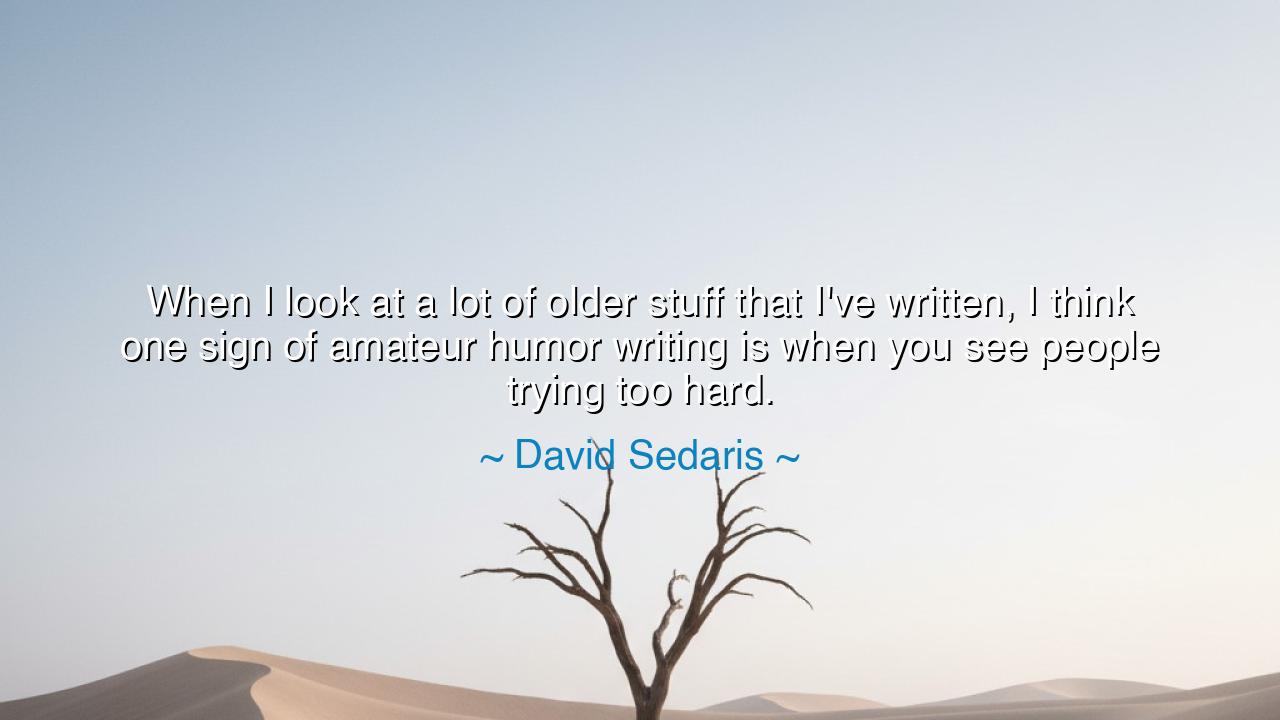
When I look at a lot of older stuff that I've written, I think
When I look at a lot of older stuff that I've written, I think one sign of amateur humor writing is when you see people trying too hard.






In the reflective and humble words of David Sedaris, master of modern wit and quiet observation, we find a lesson that reaches beyond writing itself: “When I look at a lot of older stuff that I’ve written, I think one sign of amateur humor writing is when you see people trying too hard.” This is not merely advice for the writer; it is wisdom for the artist, the speaker, the craftsman, and indeed, for every soul striving to express truth in a world obsessed with performance. For Sedaris reveals that true humor, like true wisdom, cannot be forced — it flows naturally from understanding, from authenticity, and from the quiet courage to be oneself.
The phrase “trying too hard” is the mark of one who has not yet learned to trust their own voice. It is the struggle of the apprentice who reaches for laughter rather than letting it rise. In the early work of any artist, there is this temptation: to overreach, to exaggerate, to impress. Yet, as Sedaris reminds us, the greatest humor — the kind that endures — is born not from effort, but from ease, from the acceptance of imperfection and the embrace of honesty. To “try too hard” is to fight the natural rhythm of expression, while true mastery lies in surrendering to it. The ancients called this grace, the art of doing great things without appearing to strive.
Consider the teachings of Aristotle, who spoke of ethos — the credibility of character that makes words resonate. The audience does not laugh because the speaker labors for approval; they laugh because they recognize truth in disguise. The wise comedian, like the wise philosopher, mirrors the world back to itself with gentleness. He does not shout, “See how clever I am!” but whispers, “Do you see what we all are?” So it is with Sedaris, whose humor is tender, self-deprecating, and alive with humanity. His laughter springs not from cruelty or performance, but from humility — the knowledge that we are all absurd, all foolish, and all striving to make sense of this life.
In this way, Sedaris’s reflection recalls the Stoic philosophers, who taught that serenity arises when one ceases to chase what cannot be forced. The river does not strain to flow, nor the sun to shine. So too must humor — and indeed, all art — move naturally from the depths of experience. The young writer or artist who “tries too hard” is like a singer forcing their voice: the song becomes strained, and its beauty lost. Only when one allows silence between the notes, patience between the words, does the melody of truth emerge. Effortless effort — that was the wisdom of the ancients, and it is the wisdom Sedaris rediscovers through his own journey.
History gives us many examples of this truth. The playwright Molière, revered master of comedy in seventeenth-century France, once struggled to impress his audiences with clever twists and endless jokes. His early plays were filled with noise and flourish, yet they failed to endure. It was only when he turned his gaze inward — when he began to write from his own understanding of human folly — that his genius emerged. His later works, such as Tartuffe and The Misanthrope, were not loud or frantic; they were honest, sharp, and quietly devastating. From self-awareness came greatness, just as Sedaris found his voice when he stopped reaching for laughter and began to speak plainly from the heart.
But Sedaris’s words also carry a gentler undertone — the compassion of one who remembers his own beginnings. When he speaks of his “older stuff,” he does so not with scorn, but with affection. He reminds us that every craft, every art, begins in clumsiness. The amateur must stumble before walking with grace. To “try too hard” is not a sin, but a stage — the necessary fire through which authenticity is tempered. The lesson, then, is not to despise our earlier efforts, but to grow beyond them, to trade perfection for truth, and cleverness for clarity.
So let this be the teaching, O listener: do not try too hard to be impressive — try instead to be sincere. In your words, your art, and your life, let the light of your spirit shine without adornment. Speak not to dazzle, but to connect; act not to conquer, but to reveal. Humor, like all beauty, is born from honesty — from seeing the world as it is, and loving it still. When you no longer labor to be funny, to be wise, or to be admired, you will find that these things come unbidden, like laughter that rises from the soul.
Thus, David Sedaris teaches what the ancients already knew: that art, like virtue, must spring from the heart’s stillness. The greatest works, the truest words, and the deepest laughter come not from striving, but from surrender. So live lightly, speak truthfully, and laugh often — not to impress, but to understand. For in that ease, that balance between effort and grace, lies the secret of all creation: the beauty of being exactly, fearlessly, and joyfully human.






AAdministratorAdministrator
Welcome, honored guests. Please leave a comment, we will respond soon